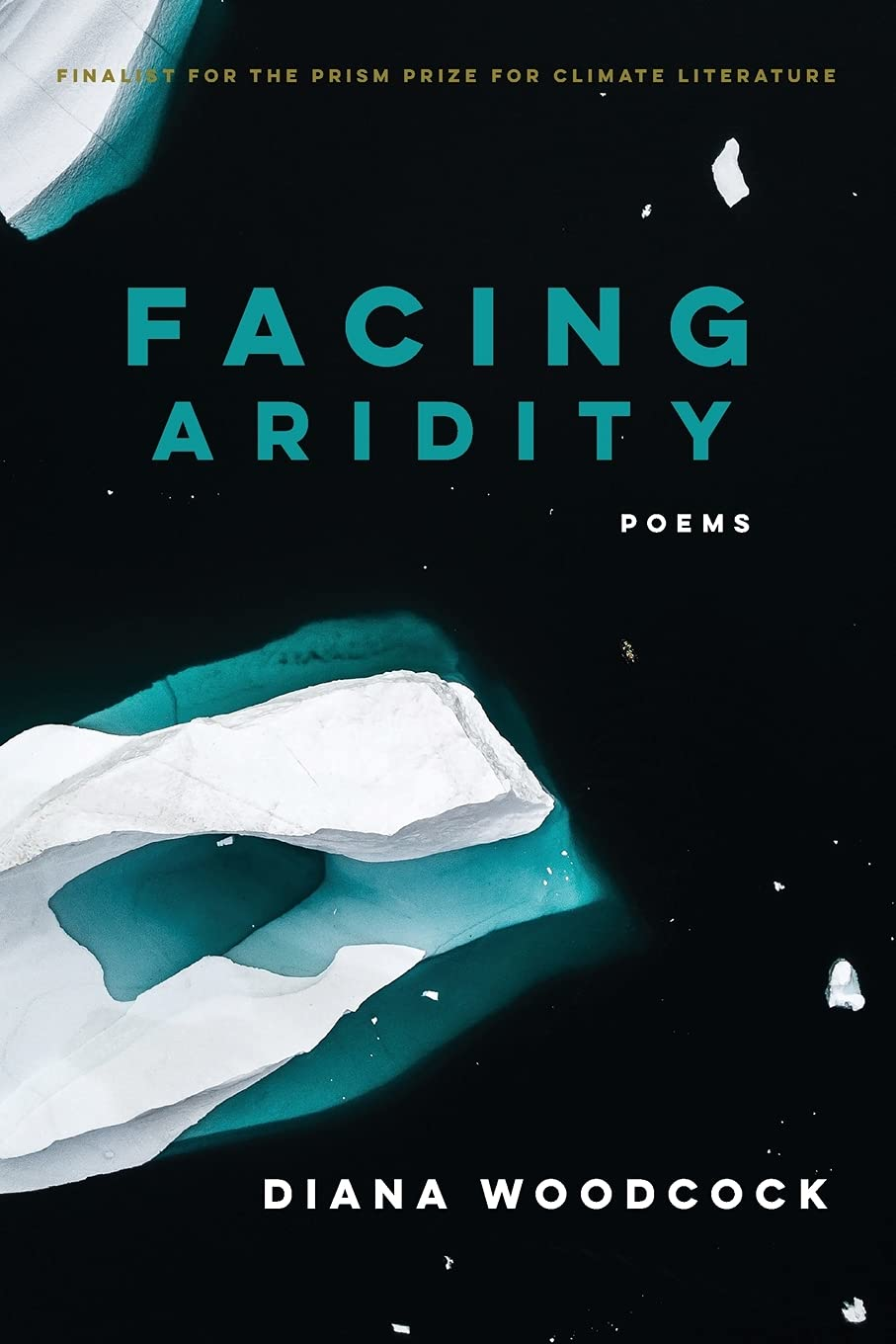You’ll sense in me a cooling of desire
for all things counted worldly and material,
while heart is wooed by what will not expire,
though it appears at times to be ethereal.
This you’ll notice of one who’s endured aridity:
come autumn she’s turned into pure fluidity.
— “Sonnet For An Arabian Autumn” (Heaven Underfoot, Codhill Press, 2023)

© 2024 Diana Woodcock, Ph.D.
Facing Aridity
2020 Prism Prize for Climate Literature Finalist
Facing Aridity by Diana Woodcock features poems inspired by research expeditions and residencies in Alaska, the Arctic Circle, the Everglades, and southern Africa; and by fifteen years spent living in Arabia. Tinged with sorrow, they offer hope as they wring out lyrical beauty from the beleaguered yet resilient natural world. Rooted in truth, they zoom in closely on the negative effects of human activity before panning back out to celebrate earth's grand design. The poet here, serving as witness to climate change while advocating for preservation and conservation, invites readers to open themselves to earth's suffering-to global sorrow-in order to transform and be transformed.
Praise
“Facing Aridity is part of the tradition of poems as essays—stanzas that survey, testify, and persuade, even as they delight. I’m particularly struck by Woodcock's integration of technical diction and sound-play, as in ‘Arctic Summer, Sozzled on Landscape’: ‘scree slopes, unconsolidated deposits / fluvial and beach—moraines, talus / cones, block fields of frost-loosened stones…alpine peaks—sharp and steep— / of granites and gneisses.’ Every page brings fresh knowledge and an immediate, inhabited dialogue with nature ranging across several key climates, right down to Svalbard poppies, Everglade alligators, and Hippocampus Kudas gliding in the Arabian Gulf. This collection is an important contribution to the canon of environmental literature that includes timely commentaries on both the aftermath of the worldwide COVID-19 pandemic, and the ongoing disaster of fracking practices in the United States.”
– Sandra Beasley, author of Made to Explode
“This Prism Prize for Climate Literature finalist book of poetry is a pilgrimage into a first-hand experience of our changing climate and its effects upon ourselves, our fellow species, and our planet. It will draw you into the deep sadness of facing the aridity unfolding at the hands of us humans, and carry you along on the author’s global journey of witnessing and naming, searching and celebrating until earth itself becomes as enchanting as these poems. Spending time immersed in Diana Woodcock’s world and words, you will feel yourself in the presence of something so powerful that the only possible response becomes something akin to prayer. And whether as lamentation, supplication, exultation, or appreciation, where there is prayer there is still hope.”
– Gail Collins-Ranadive, author of Dinosaur Dreaming, Our Climate Moment
“‘We must not cover our eyes’, the speaker says in ‘Why We Must Not Fast-forward,’ and in Diana Woodcock’s new collection of poems, Facing Aridity, readers learn quickly how to open all their senses to an amazing world of possibility but also loss. In these poems we travel to the deserts of Arabia, the Arctic Circle, the Everglades, Great Smokey Mountains, and southern Africa teeming with life that is both abundant and threatened. We learn to search the sludge of life and learn that we are kin to the smallest creatures but also the largest. Those polar travelers, Arctic terns, teach what we need to know about survival. We must face the fact that civilized man is the cruelest of all animals and learn that we cannot reconcile the scandal of squandering such peaceful creatures as the blue whale. As we contemplate the last elephants, we are forced to weigh the worth of our own lives. We are told that paradise is found not in one place but in ‘itinerancy’ by the ‘nomadic heart’ while the speaker’s homeland ‘weighs [her] down’ in ‘Facts about Fracking.’ These poems contain sadness but also inspiration: they are a call to action in the effort to cease squandering the paradise around us.”
– Deborah Fleming, author of Resurrection of the Wild: Meditations on Ohio's Natural Landscape
“The poems of Diana Woodcock’s Facing Aridity offer visceral witness to the devastation of climate change and the suffering of flora and wildlife, but also to the elemental power and beauty of the natural world – what the writer calls,’Beautiful, ruthless nature.’ The speaker is by turns, and sometimes simultaneously, lifted in awe and shut down by gloom as she observes across four hemispheres our seemingly inexorable footslog toward environmental collapse. The collection acts as a climate file that urges action with respect to decisions made in the marketplace, but also asks us to reflect upon our attitudes and spiritual postures. Throughout the collection, the poet deftly acknowledges the finiteness of this world and our time here. The effect is less a message of doom than of urgency, a reminder of the final word of Rilke's plea to ‘Live the questions now.’”
– Cesca Janece Waterfield, author of The Oyster Garden
To Order
Bibliographic Information
- isbn 9781956368000
- pages 168 pp.
- format 6 x 9" paperback
- publication date September 1, 2021
- publisher Homebound Publications/Wayfarer Books